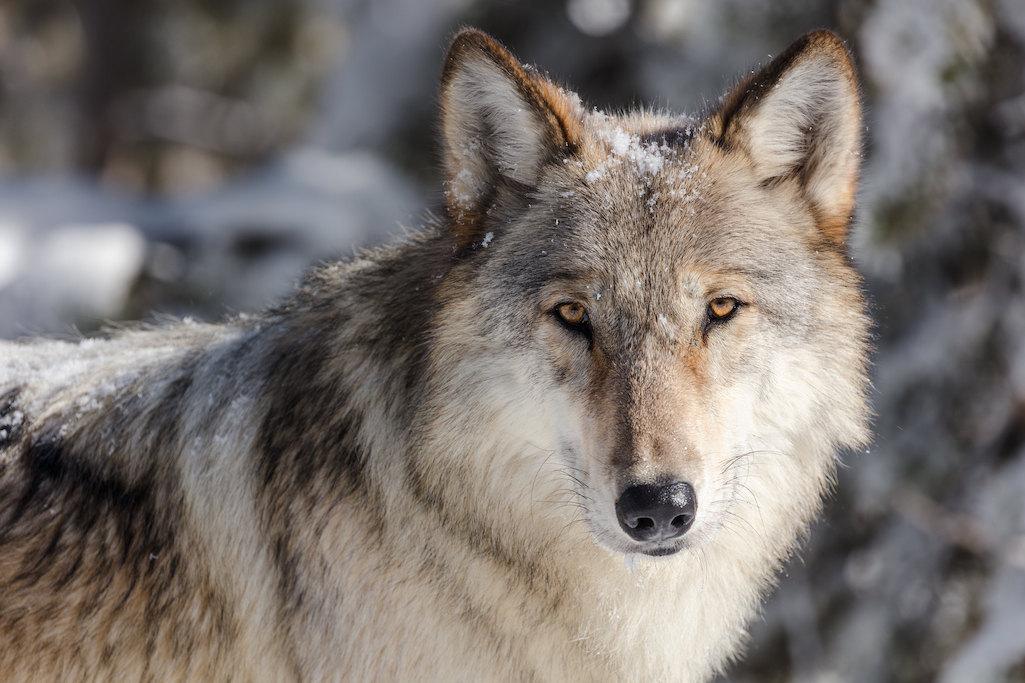
Wolf management plans are based on faulty data, according to a new study/NPS file
Wolf management plans are faulty because the data they are based on is skewed, according to a study out this week. In researching livestock losses in Wyoming, Montana, Idaho, and Wisconsin, the authors found that "the percent of livestock killed by wolves never exceeded 0.21 percent for sheep and 0.05 percent for cattle."
"These minimal livestock losses attributed to wolves are even more noteworthy because they are likely overestimated," the study, A New Era Of Wolf Management Demands Better Data And A More Inclusive Process, suggests. "In particular, the [U.S. Department of Agriculture] combines confirmed cases (kills) and probable' cases into one 'loss' figure, which will be biased upward unless every 'probable' kill is in fact caused by a wolf. Second, the USDA's livestock loss estimates are based on unverified mailed surveys, which are then extrapolated to a statewide estimate."
The study [attached below] appeared Monday in Conservation Science and Practice.
To get a sense of the accuracy of the wolf depredation extrapolations reported by the USDA, we compared these USDA estimates to the number of confirmed wolf-caused kills reported by on-the-ground state wildlife agencies. This exercise revealed greater than a tenfold difference between livestock kills confirmed by state biologists and those extrapolated by the USDA from mailed surveys. For example, in 2015 the USDA reported a total of 2,834 cattle losses due to wolves across the three states of Idaho, Montana, and Wyoming. Meanwhile, wildlife agencies across these same three states in the same 2015 calendar year confirmed only 148 total cattle killed by wolves (Coltrane et al., 2015; Idaho Department of Fish and Game, 2015; Wyoming Game and Fish Department et al., 2018). Given the historical vilification of wolves and the discrepancies in available data, there is a clear need for better verification of wolf-caused deaths.--A New Era Of Wolf Management Demands Better Data And A More Inclusive Process
The authors said better data is needed to produce better management and hunting plans for wolves in the four states studied. Input from ranchers and hunters still should be considered, they wrote, but "their objectives must be balanced with a more thorough accounting of the economic costs and benefits of wolves and wolf management strategies, as well as the cultural value of wolves."
Ecosystem benefits provided by the predators also must be taken into account, wrote the authors. Wolves actually contribute positively to local economics, "because wolves reduce deer-vehicle collisions by as much as 20 percent by altering the behavior, as well as the abundance, of their deer prey (Raynor et al., 2021). Wolves are also an important part of the Yellowstone National Park tourist experience, where they are estimated to bring in $82 million annually to the states of Idaho, Montana, and Wyoming."
"In recent decisions to kill increasing numbers of wolves, the goal of protecting ranchers from livestock losses has played an outsized role," they maintained. "But wolf management largely takes place on, and certainly has major implications for, public lands. As such, wolf management cannot be beholden to any single special interest group, whether that group is ranchers, hunters, or nature viewers."
"... [e]ven the most inclusive and best-run stakeholder discussions will get nowhere without transparent and up-to-date data that provides all parties with key information. That foundation of data is currently lacking for wolves."
The study was prepared by Peter Kareiva, Samantha Kim Attwood, Kim Bean, Desiree Felix, Michelle Marvier, Madison L. Miketa, and Elishebah Tate-Pulliam.
Kareiva is from the Aquarium of the Pacific in Long Beach, California; Attwood is from the Relist Wolves Campaign in Seattle; Bean from Wolves of the Rockies in Stevensville, Montana; Felix is also from the Aquarium of the Pacific; Marvier hails from the Environmental Studies and Science, Santa Clara University, Santa Clara, California; Miketa is from The Humane Society of the United States in Washington, DC; and Tate-Pulliam is from the Aquarium of the Pacific.
Their research was funded in part by a grant from Leslie K. Williams in support of wolf conservation and ecosystem management.

 Support Essential Coverage of Essential Places
Support Essential Coverage of Essential Places




Comments
Unless and until wolves in Montana, Idaho, and Wyoming are again placed on the ESA, like all other wolves, the same thing that happened last year in Montana will continue each hunting season. Cattle and sheep ranchers simply lie about their losses to wolves. The fact is that elk is the wolves primary food, and BTW, elk numbers remain healthy where wolves hunt except in those areas overhunted by hunters.